#Successful DevOps implementation
Explore tagged Tumblr posts
Text
#DevOps Consulting Services#DevOps Implementation Services#Steps of DevOps Implementation#Strategies of DevOps Implementation#Successful DevOps implementation
0 notes
Text
Challenges of DevOps implementation and how to solve them - VaST ITES INC.

Challenges of DevOps Implementation – how to solve them
Nowadays, major companies are trying to implement DevOps strategies for their companies. Which is a positive thing. DevOps makes your applications faster and more efficient. However, companies lack the proper know-how in the implementation of DevOps. Lack of knowledge often leads to improper and poor results. In our previous blog, we learned what is the best strategy to implement DevOps. While implementing a DevOps strategy it is natural to face challenges. Every company is unique on its own and so are the challenges it faces. In this blog, we will discuss the common challenges of DevOps implementation and how can you solve them.
continue to reading:
#DevOps implementation#best strategy to implement devops#devops strategy#challenges of devops implementation#DevOps Metrics to measure success
1 note
·
View note
Text
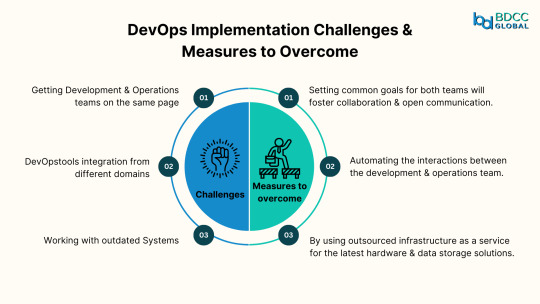
Navigating DevOps Challenges: Learn how to conquer implementation hurdles and succeed in your journey towards seamless software delivery. 🚀
1 note
·
View note
Text
Automated Testing vs. Manual Testing: Which One is Right for Your Project?

Achieving high-quality, reliable software stands as a fundamental requirement in software development. Successful testing functions as an essential tool to discover faults and build performance capabilities that create better user experience outcomes. Two main testing methods dominate the field: automated testing and manual testing. The process of quality software assurance uses different testing approaches that demonstrate their own advantages as well as weaknesses according to specific project requirements and scenarios. We will explore the specifics to determine which testing process works best for your system development efforts.
1. What Is Manual Testing?

Manual testing involves a human tester manually executing test cases without using automation tools. Key Characteristics:
The methodology focuses its efforts on user interface together with usability and experience testing.
Human-centered applications where selection requires discretion include ad hoc testing and enumerative testing as well as examinations that need human evaluation.
Human performers are required during this approach; thus, it demands substantial time.
2. What Is Automated Testing?

Software performing automated testing executes test cases through workflows and helpers. Key Characteristics:
Efficient for repetitive and regression testing.
Users must spend money on tools along with developing custom scripts for testing.
Reduces human error.
3. Advantages of Manual Testing

Human Intuition: Software testing professionals can detect kernels through their human cognitive ability that automated tools cannot match. The observation and evaluation of visual elements runs more efficiently through human operatives instead of advanced tools.
Flexibility: This method suits exploratory testing specifically because there are no pre-determined scripts available.
Low Initial Investment: Running this approach does not need tool purchases or applications to develop automation frameworks.
Adaptable for UI/UX Testing: Running this approach does not need tool purchases or applications to develop automation frameworks.
4. Advantages of Automated Testing

Speed: Executes repetitive tests much faster than humans.
Scalability: The system proves most effective for extensive projects that need constant system updates.
Accuracy: When performing recurring actions, automated systems minimize the chances of human mistakes.
Cost-Efficient in the Long Run: Once established and implemented, the system demands costly investments but ensures continuous development expenses decrease over time.
Better for CI/CD Pipelines: Such testing technology connects various development pipelines that support agile and DevOps methodologies.
5. Disadvantages of Manual Testing

Time-Consuming: The manual performance of repeated tests leads to delayed completion of projects.
Error-Prone: Large applications contain tiny bugs that human testers commonly fail to detect.
Not Ideal for Scalability: The process of increasing manual testing needs additional testers to avoid cost escalations.
6. Disadvantages of Automated Testing

Initial Costs: Organizations must provide high financial resources to procure testing tools together with developing programming constructs.
Limited to Pre-Defined Scenarios: These testing approaches work poorly for handling exploratory or ad hoc testing.
Requires Maintenance: Test scripts need frequent updates when application changes occur.
Not Suitable for UI/UX Testing: Struggles with subjective user experience evaluations.
7. When to Use Manual Testing

Small Projects: The testing method proves beneficial at a low cost for small applications and provides quick assessments.
Exploratory Testing: Testing this approach benefits projects whose scripts have not been defined yet or need evaluation for newly added features.
Visual and Usability Testing: Performing assessments on interface components together with design features.
8. When to Use Automated Testing

Large Projects: Handles scalability for projects with frequent updates.
Regression Testing: Program testing becomes more efficient through automation since automated assessments perform multiple tests following each update process.
Performance Testing: The system performs efficient capabilities to conduct load testing and stress testing.
Continuous Development Environments: Agile progression and DevOps implementations need automation as a core requirement.
READ MORE- https://www.precisio.tech/automated-testing-vs-manual-testing-which-one-is-right-for-your-project/
2 notes
·
View notes
Text
Journey to Devops
The concept of “DevOps” has been gaining traction in the IT sector for a couple of years. It involves promoting teamwork and interaction, between software developers and IT operations groups to enhance the speed and reliability of software delivery. This strategy has become widely accepted as companies strive to provide software to meet customer needs and maintain an edge, in the industry. In this article we will explore the elements of becoming a DevOps Engineer.
Step 1: Get familiar with the basics of Software Development and IT Operations:
In order to pursue a career as a DevOps Engineer it is crucial to possess a grasp of software development and IT operations. Familiarity with programming languages like Python, Java, Ruby or PHP is essential. Additionally, having knowledge about operating systems, databases and networking is vital.
Step 2: Learn the principles of DevOps:
It is crucial to comprehend and apply the principles of DevOps. Automation, continuous integration, continuous deployment and continuous monitoring are aspects that need to be understood and implemented. It is vital to learn how these principles function and how to carry them out efficiently.
Step 3: Familiarize yourself with the DevOps toolchain:
Git: Git, a distributed version control system is extensively utilized by DevOps teams, for code repository management. It aids in monitoring code alterations facilitating collaboration, among team members and preserving a record of modifications made to the codebase.
Ansible: Ansible is an open source tool used for managing configurations deploying applications and automating tasks. It simplifies infrastructure management. Saves time when performing tasks.
Docker: Docker, on the other hand is a platform for containerization that allows DevOps engineers to bundle applications and dependencies into containers. This ensures consistency and compatibility across environments from development, to production.
Kubernetes: Kubernetes is an open-source container orchestration platform that helps manage and scale containers. It helps automate the deployment, scaling, and management of applications and micro-services.
Jenkins: Jenkins is an open-source automation server that helps automate the process of building, testing, and deploying software. It helps to automate repetitive tasks and improve the speed and efficiency of the software delivery process.
Nagios: Nagios is an open-source monitoring tool that helps us monitor the health and performance of our IT infrastructure. It also helps us to identify and resolve issues in real-time and ensure the high availability and reliability of IT systems as well.
Terraform: Terraform is an infrastructure as code (IAC) tool that helps manage and provision IT infrastructure. It helps us automate the process of provisioning and configuring IT resources and ensures consistency between development and production environments.
Step 4: Gain practical experience:
The best way to gain practical experience is by working on real projects and bootcamps. You can start by contributing to open-source projects or participating in coding challenges and hackathons. You can also attend workshops and online courses to improve your skills.
Step 5: Get certified:
Getting certified in DevOps can help you stand out from the crowd and showcase your expertise to various people. Some of the most popular certifications are:
Certified Kubernetes Administrator (CKA)
AWS Certified DevOps Engineer
Microsoft Certified: Azure DevOps Engineer Expert
AWS Certified Cloud Practitioner
Step 6: Build a strong professional network:
Networking is one of the most important parts of becoming a DevOps Engineer. You can join online communities, attend conferences, join webinars and connect with other professionals in the field. This will help you stay up-to-date with the latest developments and also help you find job opportunities and success.
Conclusion:
You can start your journey towards a successful career in DevOps. The most important thing is to be passionate about your work and continuously learn and improve your skills. With the right skills, experience, and network, you can achieve great success in this field and earn valuable experience.
2 notes
·
View notes
Text
Unity's Changes
On the 12th of September Unity released a blog post concerning changes being made to their plan pricing and packaging updates. The intention behind the change is the generate more income for the company. From Unity Blog...
"Effective January 1, 2024, we will introduce a new Unity Runtime Fee that’s based on game installs. We will also add cloud-based asset storage, Unity DevOps tools, and AI at runtime at no extra cost to Unity subscription plans this November."
Unity's services consist of two products: The Unity Engine, which is the game engine used to create projects, and the Unity Runtime, which is the code the execute on a player's device that allows games made with the engine to run.
Simply put, Unity will now be charging a fee "each time a qualifying game is downloaded by an end user." The reasoning given for this change is that "each time a game is downloaded, the Unity Runtime is also installed."
While many (basically all) developers have used their collective voices to reply with a unanimous "nope", many people do not understand the very important specifics of how this will be implemented.
These fees will only take effect when the preexisting thresholds have been met. They will only be applied once a game has reached both a set revenue figure and a set lifetime install count. From the blog:
Unity Personal and Unity Plus: Those that have made $200,000 USD or more in the last 12 months AND have at least 200,000 lifetime game installs.
Unity Pro and Unity Enterprise: Those that have made $1,000,000 USD or more in the last 12 months AND have at least 1,000,000 lifetime game installs.

While this may not seem to be such a bad thing, especially since the reasoning behind the change (their Runtime product being distributed) is quite reasonable. However there are a litany of issues this will pose for developers. The smallest scale developers, such as indie devs and studios are unlikely to feel any sort of pressure from this, and the large, AAA studios also wont feel the brunt of the new pricing plan. The weight of this change falls directly onto the smaller-but-not-small studios. These studios making games for a more significant budget will essentially have these budgets put under more strain, because as soon as they begin to approach breaking even or perhaps making a profit on their projects, Unity will step in a start charging them from there on out. It is also unclear whether the developers alone will have to pay this new fee or whether it will be shared by publishers as well.
Developers are largely unhappy with this new plan because studios almost always make commercial games on very thing margins. Charging a couple cents per install does not sound like much but it can and will mean the difference between financial success and closure for many smaller studios who otherwise would have ended with their balance sheets in the green.
It is also important to be aware that, while these changes are scheduled to take effect from the start of 2024, the thresholds are retroactive, which means that if you already have reasonable install and revenue numbers (thus qualifying for the fees) you will be immediately forced to pay moving forward.
On a more informal note, there have also been some jokes made that this scheme will make it possible for players to actively harm developers if they wish. The fee is charged when an end-user (customer) downloads a game. Note that they did not say "purchases", but "downloads." Technically, this would mean that a person can buy a game (developer gains one instance of revenue) and then repeatedly download, delete and re-download the game, charging this fee each time they do this. Whether this was a poor choice of wording or a miscommunication is unclear at this time, but well let's certainly hope this new plan doesn't open up this possibility.
There are also numerous other important considerations Unity have not commented on. Do installs of pirated games count? How will these threshold figures be tracked? Also, as a massive concern, what about games that rely on in-app purchases for revenue. Below is a tweet that concisely highlights the problem.

There is also the problem of free games. This pricing plan does not take into account how much the game costs at all. Developers making a massively successful free game would end up having to pay Unity to sell a free product.
Many developers and studios are now seriously considering simply ditching Unity all together. With Unreal's much more reasonable pricing plans and the release of UE5, unless either some very significant "miscommunications" are cleared up or the plan is scrapped entirely, this will likely be the beginning of the end for Unity. As a learning indie developer myself, having been a die-hard Unity supported until this announcement, I do not know how to express my disappointment, and if Unity follows through with this scheme on 01/01/2024, even if they reverse it later, I will never open another one of this fucking greedy company's products ever again.
Sources: - https://blog.unity.com/news/plan-pricing-and-packaging-updates - https://www.youtube.com/watch?v=JQSDsjJAics
11 notes
·
View notes
Text
The Ultimate DevOps Course Will Help You Realise Your Full Potential
In today's fast-paced and highly competitive professional world, individuals constantly strive to expand their skill set and stay ahead of the curve. With the ever-evolving technology landscape, knowing how to efficiently manage software development processes has become crucial. Enter DevOps, a methodology that revolutionizes collaboration between development and operations teams, leading to increased productivity, better software quality, and faster deployment. To unleash your true potential as a professional, consider enrolling in the ultimate DevOps course. In this article, we will delve into the reasons why you should embark on this transformative journey and the numerous benefits that await you.

Reasons to Do the Ultimate DevOps Course
1. Bridge the Gap Between Development and Operations
DevOps serves as a bridge — a conduit, if you will — between development and operations teams, fostering a seamless and harmonious collaboration. By undertaking the ultimate DevOps course, you can acquire the knowledge and skills to facilitate effective communication and collaboration between these traditionally siloed departments. Understanding the nuances of both sides will enable you to streamline processes, actively participate in cross-functional discussions, and contribute significantly to your organization's success.
2. Embrace Automation and Efficiency
Automation lies at the core of DevOps principles, and mastering this art can revolutionize your professional journey. The ultimate DevOps course empowers you to gain expertise in leveraging automation tools and technologies, empowering you to automate routine tasks, minimize manual interventions, and increase overall efficiency. By eliminating repetitive and time-consuming operations, you can amplify your productivity and focus on high-value activities, leaving an indelible impact on your personal and professional growth.
3. Foster Continuous Integration and Deployment
Continuous Integration and Deployment (CI/CD) has revolutionized software development, enabling rapid and reliable release cycles. By joining the ultimate DevOps course, you can comprehensively understand these practices and their significance. Embracing CI/CD can empower you to automate build, test, and deployment processes, resulting in accelerated time-to-market, reduced errors, and seamless collaboration within your team. By adopting these practices, you position yourself as a forward-thinking professional committed to delivering top-notch software solutions rapidly and consistently.
4. Cultivate a Culture of Continuous Improvement
DevOps embodies a culture of continuous improvement and learning. By enrolling in the ultimate DevOps course, you embrace this mindset, nurturing your personal and professional growth. The course equips you with the knowledge to implement feedback loops, monitor performance metrics, and continuously refine your development and operational practices. By actively seeking opportunities to optimize processes and learn from previous experiences, you cultivate an environment of innovation and progress, enhancing your career prospects and adaptability in an ever-evolving industry.
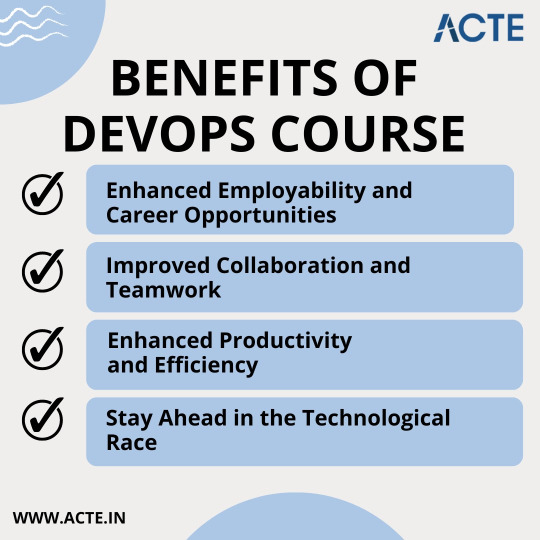
Benefits of the Ultimate DevOps Course
1. Enhanced Employability and Career Opportunities
In today's competitive job market, possessing DevOps skills has become highly sought after by organizations across industries. By completing the ultimate DevOps course, you position yourself as a highly desirable candidate, equipped with the expertise to bridge the gap between development and operations. This enhanced employability opens doors to a myriad of exciting career opportunities, potentially leading to higher salaries, increased job satisfaction, and accelerated professional growth.
2. Improved Collaboration and Teamwork
DevOps thrives on the foundation of collaboration and teamwork. By immersing yourself in the ultimate DevOps course, you develop a deep understanding of these principles, allowing you to foster effective collaboration within your team. The course emphasizes the importance of cross-functional communication, empathy, and shared responsibility, enabling you to build strong relationships and work synergistically towards shared goals. Enhanced collaboration not only enhances the quality of your work but also fosters a positive work environment and boosts overall team morale.
3. Enhanced Productivity and Efficiency
As a result of the ultimate DevOps course, you will acquire a wide range of techniques and tools to optimize workflow and amplify your productivity. By taking advantage of automation and streamlining processes, you can eliminate bottlenecks and time-consuming operations, allowing you to focus on delivering exceptional results. The course equips you with skills to manage complex projects more efficiently and implement strategies that maximize efficiency. Ultimately, increased productivity leads to higher job satisfaction and sets the stage for personal and professional success.
4. Stay Ahead in the Technological Race
The world is rapidly evolving, and technology plays a pivotal role in driving progress. By completing the ultimate DevOps course, you position yourself at the forefront of this technological race. The course equips you with up-to-date knowledge and the ability to adapt to emerging trends and industry practices swiftly. By staying ahead of the curve and embracing the latest tools and techniques, you establish yourself as a modern, forward-thinking professional, capable of spearheading innovation and thriving in an ever-changing landscape.
Investing in your professional development by enrolling in the ultimate DevOps course at ACTE Technologies is a strategic decision that can unlock your full potential. By bridging the gap between development and operations, harnessing the power of automation, embracing continuous integration and deployment, and fostering a culture of continuous improvement, you pave the way for enhanced employability, improved collaboration, increased productivity, and the ability to stay one step ahead in the technological race. Don't limit yourself - seize the opportunity, unlock your full potential, and embark on the transformative journey of mastering DevOps.
10 notes
·
View notes
Text
Navigating the DevOps Landscape: A Comprehensive Roadmap for Success
Introduction: In the rapidly evolving realm of software development, DevOps stands as a pivotal force reshaping the way teams collaborate, deploy, and manage software. This detailed guide delves into the essence of DevOps, its core principles, and presents a step-by-step roadmap to kickstart your journey towards mastering DevOps methodologies.
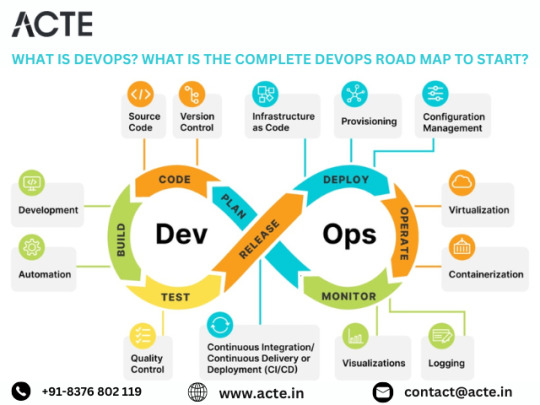
Exploring the Core Tenets of DevOps: DevOps transcends mere toolsets; it embodies a cultural transformation focused on fostering collaboration, automation, and continual enhancement. At its essence, DevOps aims to dismantle barriers between development and operations teams, fostering a culture of shared ownership and continuous improvement.
Grasping Essential Tooling and Technologies: To embark on your DevOps odyssey, familiarizing yourself with the key tools and technologies within the DevOps ecosystem is paramount. From version control systems like Git to continuous integration servers such as Jenkins and containerization platforms like Docker, a diverse array of tools awaits exploration.
Mastery in Automation: Automation serves as the cornerstone of DevOps. By automating routine tasks like code deployment, testing, and infrastructure provisioning, teams can amplify efficiency, minimize errors, and accelerate software delivery. Proficiency in automation tools and scripting languages is imperative for effective DevOps implementation.
Crafting Continuous Integration/Continuous Delivery Pipelines: Continuous Integration (CI) and Continuous Delivery (CD) lie at the heart of DevOps practices. CI/CD pipelines automate the process of integrating code changes, executing tests, and deploying applications, ensuring rapid, reliable, and minimally manual intervention-driven software changes.
Embracing Infrastructure as Code (IaC): Infrastructure as Code (IaC) empowers teams to define and manage infrastructure through code, fostering consistency, scalability, and reproducibility. Treating infrastructure as code enables teams to programmatically provision, configure, and manage infrastructure resources, streamlining deployment workflows.

Fostering Collaboration and Communication: DevOps champions collaboration and communication across development, operations, and other cross-functional teams. By nurturing a culture of shared responsibility, transparency, and feedback, teams can dismantle silos and unite towards common objectives, resulting in accelerated delivery and heightened software quality.
Implementing Monitoring and Feedback Loops: Monitoring and feedback mechanisms are integral facets of DevOps methodologies. Establishing robust monitoring and logging solutions empowers teams to monitor application and infrastructure performance, availability, and security in real-time. Instituting feedback loops enables teams to gather insights and iteratively improve based on user feedback and system metrics.
Embracing Continuous Learning and Growth: DevOps thrives on a culture of continuous learning and improvement. Encouraging experimentation, learning, and knowledge exchange empowers teams to adapt to evolving requirements, technologies, and market dynamics, driving innovation and excellence.
Remaining Current with Industry Dynamics: The DevOps landscape is dynamic, with new tools, technologies, and practices emerging regularly. Staying abreast of industry trends, participating in conferences, webinars, and engaging with the DevOps community are essential for staying ahead. By remaining informed, teams can leverage the latest advancements to enhance their DevOps practices and deliver enhanced value to stakeholders.
Conclusion: DevOps represents a paradigm shift in software development, enabling organizations to achieve greater agility, efficiency, and innovation. By following this comprehensive roadmap and tailoring it to your organization's unique needs, you can embark on a transformative DevOps journey and drive positive change in your software delivery processes.
2 notes
·
View notes
Text
Charting Career Ascent: Navigating the Dynamic Realms of AWS Cloud Expertise
Embarking on a professional journey in Amazon Web Services (AWS) cloud computing unveils a realm where innovation, adaptability, and continual growth intersect. Let's unravel the layers that make an AWS career not just promising but a vibrant tapestry of learning and opportunity.

1. Surging Demand in the Digital Frontier:
The professional landscape is witnessing an escalating demand for skilled AWS practitioners. With businesses globally embracing cloud technologies, there is an unprecedented need for individuals proficient in crafting, implementing, and overseeing cloud infrastructures.
2. Roles Tailored to Individual Expertise:
AWS distinguishes itself by offering a diverse array of roles that cater to a wide spectrum of skills. Whether one's passion lies in architecting cloud solutions, fortifying security measures, delving into development, embracing DevOps methodologies, unraveling the intricacies of data analytics, or exploring machine learning, AWS provides roles that resonate with individual expertise and career aspirations.
3. Cultivating a Culture of Continuous Learning:
Central to AWS is a commitment to innovation that fosters a culture of continuous learning. The platform's regular introduction of novel services and features not only encourages but necessitates staying abreast of the latest technologies for success in the ever-evolving field of cloud computing.
4. Global Career Horizons:
AWS's prominence as a global cloud services leader opens up expansive career opportunities. Working with international teams, contributing to projects with a global impact, and having the flexibility to explore diverse career options across geographical locations are intrinsic benefits of an AWS career.
5. Competitive Compensation and Professional Advancement:
The demand for AWS professionals, coupled with certifications and expertise, translates into competitive remuneration. Beyond monetary rewards, AWS offers a trajectory for continual professional growth as individuals accumulate experience and certifications within the dynamic realm of cloud computing.

6. Versatility Across Industries:
AWS's adaptability spans across a myriad of industries including finance, healthcare, e-commerce, and entertainment. This versatility empowers professionals to align their careers with industries of personal interest, contributing to impactful projects in diverse sectors.
7. Certification Validation and Professional Credibility:
AWS's robust certification program provides a structured framework for professionals to validate their expertise. Earning AWS certifications not only enhances credibility in the job market but serves as tangible evidence of proficiency in specific AWS services and roles.
8. A Flourishing Ecosystem and Community Synergy:
Being an integral part of the AWS ecosystem brings manifold advantages. Access to a vast network of partners, clients, and a thriving community provides invaluable opportunities for networking, collaboration, and a continual awareness of industry trends.
9. Flexibility with Remote Work:
The inherent nature of cloud computing often facilitates remote work opportunities. This flexibility in work arrangements is particularly appealing to those seeking a harmonious work-life balance or exploring career possibilities beyond the confines of their immediate physical location.
10. Future-Proofing Careers with AWS Prowess:
The ongoing paradigm shift of businesses to the cloud positions an AWS career as potentially future-proof. As skills in AWS cloud computing become increasingly indispensable, professionals find themselves at the forefront of technology trends, ensuring continued relevance in the dynamic field of cloud computing.
In conclusion, stepping into an AWS cloud computing career promises not just a job but an immersive journey into a realm where each stride unfolds new discoveries and opportunities for professional excellence. The dynamic and ever-evolving nature of AWS makes it a prime choice for those aiming to carve a successful and fulfilling career path in the technology industry.
2 notes
·
View notes
Text
Going Over the Cloud: An Investigation into the Architecture of Cloud Solutions

Because the cloud offers unprecedented levels of size, flexibility, and accessibility, it has fundamentally altered the way we approach technology in the present digital era. As more and more businesses shift their infrastructure to the cloud, it is imperative that they understand the architecture of cloud solutions. Join me as we examine the core concepts, industry best practices, and transformative impacts on modern enterprises.
The Basics of Cloud Solution Architecture A well-designed architecture that balances dependability, performance, and cost-effectiveness is the foundation of any successful cloud deployment. Cloud solutions' architecture is made up of many different components, including networking, computing, storage, security, and scalability. By creating solutions that are tailored to the requirements of each workload, organizations can optimize return on investment and fully utilize the cloud.
Flexibility and Resilience in Design The flexibility of cloud computing to grow resources on-demand to meet varying workloads and guarantee flawless performance is one of its distinguishing characteristics. Cloud solution architecture create resilient systems that can endure failures and sustain uptime by utilizing fault-tolerant design principles, load balancing, and auto-scaling. Workloads can be distributed over several availability zones and regions to help enterprises increase fault tolerance and lessen the effect of outages.
Protection of Data in the Cloud and Security by Design
As data thefts become more common, security becomes a top priority in cloud solution architecture. Architects include identity management, access controls, encryption, and monitoring into their designs using a multi-layered security strategy. By adhering to industry standards and best practices, such as the shared responsibility model and compliance frameworks, organizations may safeguard confidential information and guarantee regulatory compliance in the cloud.
Using Professional Services to Increase Productivity Cloud service providers offer a variety of managed services that streamline operations and reduce the stress of maintaining infrastructure. These services allow firms to focus on innovation instead of infrastructure maintenance. They include server less computing, machine learning, databases, and analytics. With cloud-native applications, architects may reduce costs, increase time-to-market, and optimize performance by selecting the right mix of managed services.
Cost control and ongoing optimization Cost optimization is essential since inefficient resource use can quickly drive up costs. Architects monitor resource utilization, analyze cost trends, and identify opportunities for optimization with the aid of tools and techniques. Businesses can cut waste and maximize their cloud computing expenses by using spot instances, reserved instances, and cost allocation tags.
Acknowledging Automation and DevOps Important elements of cloud solution design include automation and DevOps concepts, which enable companies to develop software more rapidly, reliably, and efficiently. Architects create pipelines for continuous integration, delivery, and deployment, which expedites the software development process and allows for rapid iterations. By provisioning and managing infrastructure programmatically with Infrastructure as Code (IaC) and Configuration Management systems, teams may minimize human labor and guarantee consistency across environments.
Multiple-cloud and hybrid strategies In an increasingly interconnected world, many firms employ hybrid and multi-cloud strategies to leverage the benefits of many cloud providers in addition to on-premises infrastructure. Cloud solution architects have to design systems that seamlessly integrate several environments while ensuring interoperability, data consistency, and regulatory compliance. By implementing hybrid connection options like VPNs, Direct Connect, or Express Route, organizations may develop hybrid cloud deployments that include the best aspects of both public and on-premises data centers. Analytics and Data Management Modern organizations depend on data because it fosters innovation and informed decision-making. Thanks to the advanced data management and analytics solutions developed by cloud solution architects, organizations can effortlessly gather, store, process, and analyze large volumes of data. By leveraging cloud-native data services like data warehouses, data lakes, and real-time analytics platforms, organizations may gain a competitive advantage in their respective industries and extract valuable insights. Architects implement data governance frameworks and privacy-enhancing technologies to ensure adherence to data protection rules and safeguard sensitive information.
Computing Without a Server Server less computing, a significant shift in cloud architecture, frees organizations to focus on creating applications rather than maintaining infrastructure or managing servers. Cloud solution architects develop server less programs using event-driven architectures and Function-as-a-Service (FaaS) platforms such as AWS Lambda, Azure Functions, or Google Cloud Functions. By abstracting away the underlying infrastructure, server less architectures offer unparalleled scalability, cost-efficiency, and agility, empowering companies to innovate swiftly and change course without incurring additional costs.
Conclusion As we come to the close of our investigation into cloud solution architecture, it is evident that the cloud is more than just a platform for technology; it is a force for innovation and transformation. By embracing the ideas of scalability, resilience, and security, and efficiency, organizations can take advantage of new opportunities, drive business expansion, and preserve their competitive edge in today's rapidly evolving digital market. Thus, to ensure success, remember to leverage cloud solution architecture when developing a new cloud-native application or initiating a cloud migration.
1 note
·
View note
Text
#DevOps Consulting Services#DevOps Implementation Services#Steps of DevOps Implementation#Strategies of DevOps Implementation#Successful DevOps implementation
0 notes
Text
Challenges of DevOps Implementation – how to solve them
Nowadays, major companies are trying to implement DevOps strategies for their companies. Which is a positive thing. DevOps makes your applications faster and more efficient. However, companies lack the proper know-how in the implementation of DevOps. Lack of knowledge often leads to improper and poor results. In our previous blog, we learned what is the best strategy to implement DevOps. While implementing a DevOps strategy it is natural to face challenges. Every company is unique on its own and so are the challenges it faces. In this blog, we will discuss the common challenges of DevOps implementation and how can you solve them.
continue to reading:
#DevOps implementation#best strategy to implement devops#devops strategy#challenges of devops implementation#DevOps Metrics to measure success#Devops#docker#kubernetes
1 note
·
View note
Text
Full Stack Development: Using DevOps and Agile Practices for Success
In today��s fast-paced and highly competitive tech industry, the demand for Full Stack Developers is steadily on the rise. These versatile professionals possess a unique blend of skills that enable them to handle both the front-end and back-end aspects of software development. However, to excel in this role and meet the ever-evolving demands of modern software development, Full Stack Developers are increasingly turning to DevOps and Agile practices. In this comprehensive guide, we will explore how the combination of Full Stack Development with DevOps and Agile methodologies can lead to unparalleled success in the world of software development.

Full Stack Development: A Brief Overview
Full Stack Development refers to the practice of working on all aspects of a software application, from the user interface (UI) and user experience (UX) on the front end to server-side scripting, databases, and infrastructure on the back end. It requires a broad skill set and the ability to handle various technologies and programming languages.
The Significance of DevOps and Agile Practices
The environment for software development has changed significantly in recent years. The adoption of DevOps and Agile practices has become a cornerstone of modern software development. DevOps focuses on automating and streamlining the development and deployment processes, while Agile methodologies promote collaboration, flexibility, and iterative development. Together, they offer a powerful approach to software development that enhances efficiency, quality, and project success. In this blog, we will delve into the following key areas:
Understanding Full Stack Development
Defining Full Stack Development
We will start by defining Full Stack Development and elucidating its pivotal role in creating end-to-end solutions. Full Stack Developers are akin to the Swiss Army knives of the development world, capable of handling every aspect of a project.
Key Responsibilities of a Full Stack Developer
We will explore the multifaceted responsibilities of Full Stack Developers, from designing user interfaces to managing databases and everything in between. Understanding these responsibilities is crucial to grasping the challenges they face.
DevOps’s Importance in Full Stack Development
Unpacking DevOps
A collection of principles known as DevOps aims to eliminate the divide between development and operations teams. We will delve into what DevOps entails and why it matters in Full Stack Development. The benefits of embracing DevOps principles will also be discussed.
Agile Methodologies in Full Stack Development
Introducing Agile Methodologies
Agile methodologies like Scrum and Kanban have gained immense popularity due to their effectiveness in fostering collaboration and adaptability. We will introduce these methodologies and explain how they enhance project management and teamwork in Full Stack Development.
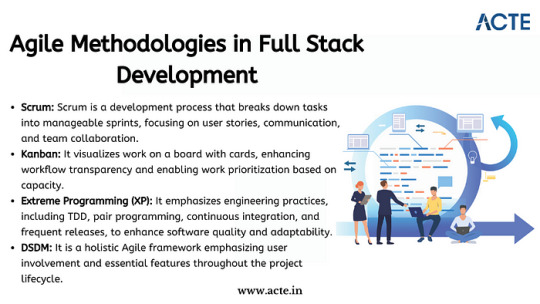
Synergy Between DevOps and Agile
The Power of Collaboration
We will highlight how DevOps and Agile practices complement each other, creating a synergy that streamlines the entire development process. By aligning development, testing, and deployment, this synergy results in faster delivery and higher-quality software.
Tools and Technologies for DevOps in Full Stack Development
Essential DevOps Tools
DevOps relies on a suite of tools and technologies, such as Jenkins, Docker, and Kubernetes, to automate and manage various aspects of the development pipeline. We will provide an overview of these tools and explain how they can be harnessed in Full Stack Development projects.

Implementing Agile in Full Stack Projects
Agile Implementation Strategies
We will delve into practical strategies for implementing Agile methodologies in Full Stack projects. Topics will include sprint planning, backlog management, and conducting effective stand-up meetings.
Best Practices for Agile Integration
We will share best practices for incorporating Agile principles into Full Stack Development, ensuring that projects are nimble, adaptable, and responsive to changing requirements.
Learning Resources and Real-World Examples
To gain a deeper understanding, ACTE Institute present case studies and real-world examples of successful Full Stack Development projects that leveraged DevOps and Agile practices. These stories will offer valuable insights into best practices and lessons learned. Consider enrolling in accredited full stack developer training course to increase your full stack proficiency.
Challenges and Solutions
Addressing Common Challenges
No journey is without its obstacles, and Full Stack Developers using DevOps and Agile practices may encounter challenges. We will identify these common roadblocks and provide practical solutions and tips for overcoming them.
Benefits and Outcomes
The Fruits of Collaboration
In this section, we will discuss the tangible benefits and outcomes of integrating DevOps and Agile practices in Full Stack projects. Faster development cycles, improved product quality, and enhanced customer satisfaction are among the rewards.
In conclusion, this blog has explored the dynamic world of Full Stack Development and the pivotal role that DevOps and Agile practices play in achieving success in this field. Full Stack Developers are at the forefront of innovation, and by embracing these methodologies, they can enhance their efficiency, drive project success, and stay ahead in the ever-evolving tech landscape. We emphasize the importance of continuous learning and adaptation, as the tech industry continually evolves. DevOps and Agile practices provide a foundation for success, and we encourage readers to explore further resources, courses, and communities to foster their growth as Full Stack Developers. By doing so, they can contribute to the development of cutting-edge solutions and make a lasting impact in the world of software development.
#web development#full stack developer#devops#agile#education#information#technology#full stack web development#innovation
2 notes
·
View notes
Text
Unlocking Agile Development: The DevOps Advantage
In today's rapidly evolving tech landscape, staying ahead of the competition requires more than just developing code—it requires an agile approach to development. Agile methodologies have transformed the way software is built and delivered, emphasizing collaboration, flexibility, and continuous improvement. But what if there was a way to further enhance the agility of your development process? Enter DevOps—the ultimate catalyst for unleashing the true potential of agile development.

The Synergy of Agile and DevOps: A Perfect Match
Agile development focuses on iterative development, frequent feedback, and close collaboration between cross-functional teams. DevOps, on the other hand, goes beyond development to encompass the entire software delivery pipeline, including testing, integration, deployment, and monitoring. The integration of these two powerful methodologies creates a synergy that turbocharges development cycles and drives innovation.
Fostering Collaboration and Communication
At the heart of both agile and DevOps lies a shared value—collaboration. DevOps breaks down traditional silos between development and operations teams, fostering open communication and shared responsibilities. This alignment ensures that developers, testers, and operations work seamlessly together, leading to a faster and more reliable development process.
Continuous Delivery: The Engine of Innovation
Continuous Delivery (CD) is a cornerstone of DevOps, allowing code changes to be automatically built, tested, and deployed to production environments. This not only reduces the time and effort required for manual testing and deployment but also ensures that your application is always in a releasable state. As a result, development teams can focus on what they do best—innovating and creating—rather than getting bogged down in deployment complexities.
Accelerated Feedback Loops for Quality Enhancement
Agile development thrives on quick feedback loops, and DevOps extends this principle to the entire development lifecycle. With continuous integration and automated testing in DevOps, developers receive immediate feedback on the quality of their code. This enables rapid identification and resolution of issues, resulting in higher-quality software that's ready for deployment at any moment.
Enhanced Flexibility and Adaptability
Agile emphasizes adaptability to changing requirements, and DevOps amplifies this agility by making deployments less risky and more frequent. As a result, teams can respond to market demands and user feedback faster than ever before. Whether it's adding new features, fixing bugs, or addressing security vulnerabilities, DevOps ensures that your software remains responsive and relevant.
The Path Forward: Embracing DevOps for Agile Excellence
To unlock the true potential of agile development, it's essential to embrace DevOps practices. Start by fostering a culture of collaboration, where teams work harmoniously towards shared goals. Invest in automation tools that streamline the deployment process, allowing for faster and error-free releases. Implement continuous integration, automated testing, and continuous monitoring to ensure the quality and reliability of your applications.

Conclusion
While agile development provides the foundation for rapid software delivery, DevOps supercharges this foundation with enhanced collaboration, continuous delivery, and faster innovation. The result is a dynamic development environment that empowers teams to meet customer expectations, adapt to market changes, and drive business success. By integrating DevOps practices into your agile framework, you can truly unlock the DevOps advantage and revolutionize the way you develop, deliver, and excel in the world of software development.
Yes we do provide full courses related to DevOps.
So accelerate your career with our Courses.
Courses USP -
80+ hours of trainning
100% placement asssitance
Hiring Partners.
For more info log in to - https://www.logipool.org/
#devops#devopscourses#devopscoursesinpune#coding#devopsonlinecourses#devopsplacemnts#jobsafterdevops#salaryafterdevops
2 notes
·
View notes
Text
Salesforce DevOps for Developers
Salesforce DevOps is essential for organizations using the Salesforce platform because it enables efficient and collaborative development, seamless deployment, and effective management of Salesforce applications.
Here are some key reasons why Salesforce DevOps is important:
Collaboration: Salesforce DevOps promotes collaboration among developers, administrators, and stakeholders involved in the application development and deployment process. It provides a structured framework for teams to work together, share code, track changes, and manage releases, leading to better teamwork and streamlined development workflows.
Continuous Integration and Deployment: DevOps practices enable continuous integration and deployment, allowing organizations to deliver updates and enhancements to Salesforce applications more frequently and reliably. By automating build, test, and deployment processes, organizations can reduce manual errors, accelerate release cycles, and ensure consistent quality.
Version Control: Salesforce DevOps facilitates version control, allowing developers to track changes to their code and metadata over time. This helps in managing multiple development branches, reviewing changes, reverting to previous versions if needed, and maintaining a history of changes for auditing purposes.
Quality Assurance: DevOps practices, such as automated testing, ensure the quality and stability of Salesforce applications. By automating test cases, organizations can validate changes, identify bugs or issues early in the development process, and deliver high-quality applications to end-users.
Scalability and Efficiency: Salesforce DevOps enables organizations to scale their development processes and efficiently manage multiple Salesforce orgs, sandboxes, and environments. With automation and standardization, organizations can easily replicate environments, streamline deployment processes, and handle increased development and deployment demands.
Risk Mitigation: DevOps practices help mitigate risks associated with deploying changes to production environments. By implementing practices like continuous integration, automated testing, and incremental deployments, organizations can minimize the impact of potential issues or errors, ensuring a smooth and controlled release process.
Continuous Improvement: Salesforce DevOps emphasizes a culture of continuous improvement, where organizations can gather feedback, monitor performance, and make data-driven decisions to enhance their applications and development processes over time. It enables organizations to iterate and evolve their applications based on user needs and market demands.
Overall, Salesforce DevOps aligns development, operations, and business objectives, enabling organizations to deliver high-quality applications faster, reduce time-to-market, and enhance the overall user experience. It improves collaboration, efficiency, and agility, making it an essential practice for successful Salesforce application development and management.
#salesforce
#salesforce #CRM #startups#salesforce partner#technology#salesforce integration#SalesforceConsultant#getoncrm
2 notes
·
View notes
Text
Master the Recipe for Success: DevOps Training to Fuel Innovation and Growth
In today's technology-driven world, businesses across industries are constantly striving to enhance their operations and stay ahead of the competition. Successful companies understand that innovation and growth go hand in hand, and one key ingredient in this recipe for success is DevOps training. By investing in DevOps education and information technology (IT), organizations can equip their teams with the necessary skills and knowledge to streamline development processes, promote collaboration, and drive efficiency. This article explores the significance of DevOps training and how it can fuel innovation and growth within an organization.
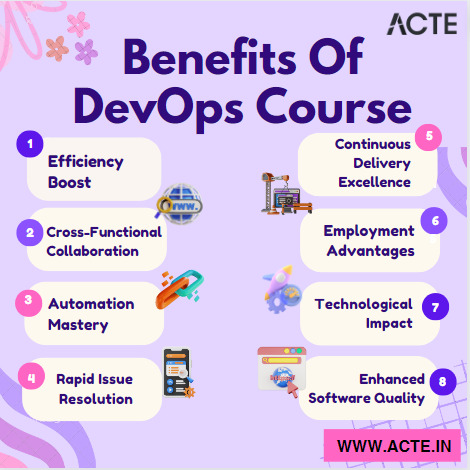
The Advantages of DevOps Training
DevOps training offers numerous benefits to organizations seeking to optimize their development lifecycle and foster a culture of innovation. Here are some advantages associated with investing in DevOps education:
Enhanced Collaboration: DevOps training promotes a collaborative mindset by breaking down silos between development and operations teams. Through cross-functional training, individuals gain a deeper understanding of each other's roles, fostering communication and cooperation.
Streamlined Development Processes: With a strong DevOps foundation, businesses can streamline their development processes by implementing automation, continuous integration, and continuous delivery (CI/CD) practices. These streamlined processes reduce bottlenecks, minimize errors, and accelerate time-to-market.
Improved Efficiency and Productivity: By equipping employees with the necessary skills to effectively utilize DevOps tools and techniques, organizations can dramatically enhance efficiency and productivity. Training empowers team members to leverage automation tools, optimize workflows, and reduce manual effort.
Better Quality and Reliability: Through DevOps education, individuals gain expertise in implementing robust testing practices and quality assurance techniques. This results in improved software reliability, minimal downtime, and enhanced customer satisfaction.
Exploring DevOps Training Options
When considering DevOps training, organizations have a range of options to choose from. These options cater to diverse learning preferences and can be tailored to meet specific business needs. Here are some popular DevOps training choices:
1. Instructor-Led Training
Instructor-led training programs offer a structured approach to learning, combining theoretical concepts with hands-on exercises. Students benefit from real-time interaction with experienced instructors and fellow learners, fostering a deeper understanding of DevOps principles and best practices.
2. Online Courses
Online courses provide flexibility and convenience for individuals seeking to acquire DevOps skills at their own pace. These courses often consist of pre-recorded videos, interactive quizzes, and comprehensive learning materials. Students can access the content anytime, anywhere, making it ideal for busy professionals.
3. Certifications
Obtaining a recognized DevOps certification can be a valuable asset for career advancement and professional growth. Certifications validate an individual's expertise in DevOps methodologies and tools, instilling confidence in employers and clients alike. Several reputable organizations offer DevOps certifications, such as the DevOps Institute and Amazon Web Services.

The Role of IT in DevOps Training
Information technology plays a pivotal role in enabling successful DevOps training initiatives. IT teams act as facilitators, providing the necessary infrastructure, tools, and resources to support training efforts. Here are essential aspects of IT's involvement:
Provision of Training Environments: IT departments ensure the availability of training environments, such as virtual machines or cloud-based labs, where learners can practice deploying software, configuring systems, and working with various DevOps tools.
Management of Training Platforms: IT teams oversee and maintain the learning platforms used for delivering DevOps training. This involves ensuring proper access control, monitoring system performance, and troubleshooting any technical issues that may arise.
Support for Tool Adoption: IT professionals assist in the adoption and integration of DevOps tools into existing systems. This includes providing guidance on tool selection, configuration, and customization to align with an organization's unique requirements.
Security and Compliance Considerations: IT personnel play a crucial role in ensuring that all training activities align with security policies and compliance regulations. They implement measures to protect sensitive data, secure communication channels, and maintain the integrity of training environments.
DevOps training serves as a catalyst for innovation and growth within organizations by fostering collaboration, streamlining development processes, improving efficiency, and promoting quality. By investing in ACTE institute DevOps training options, businesses can equip their teams with the knowledge and skills needed to adapt and thrive in an ever-evolving digital landscape. With the crucial support of information technology, organizations can maximize the potential of DevOps training and embark on a path towards sustained success.
9 notes
·
View notes